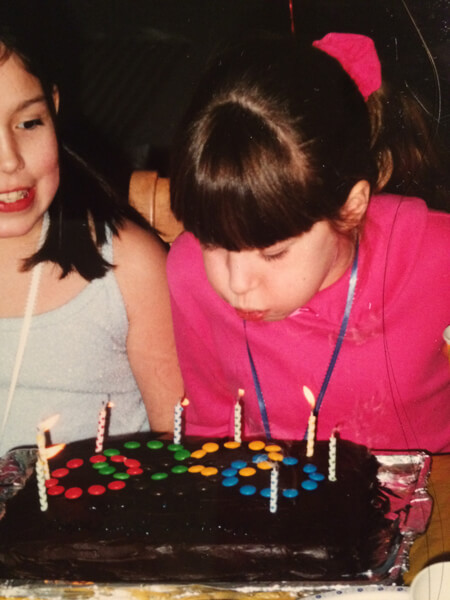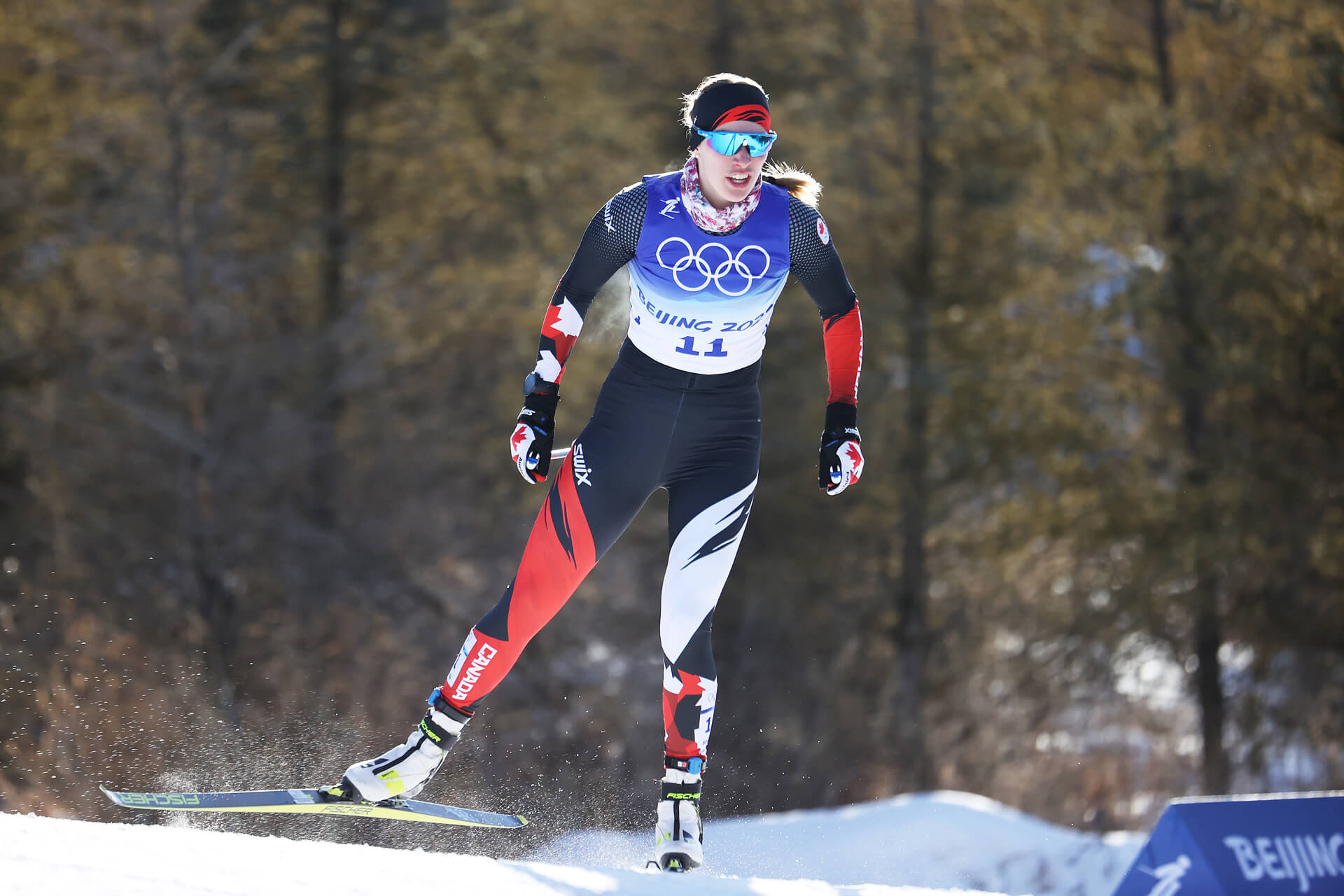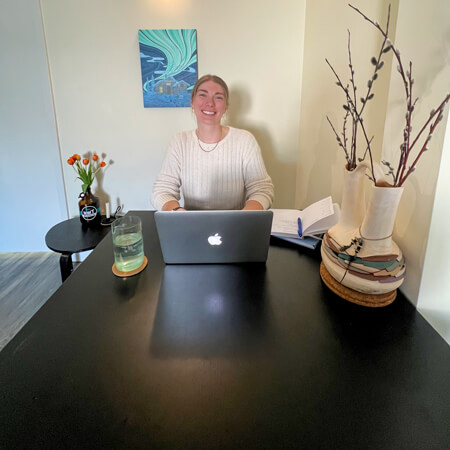Dahria Beatty spent 16 years working toward her Olympic dream. Now she’s about to cap 12 years of part-time study at Athabasca University.
As an elite, high-performance athlete, Dahria Beatty (Bachelor of Management ’25) is pretty good at making goals and following through.
Goal setting led her to her first cross-country skiing competition, the 2004 Arctic Winter Games, where at nine years old she competed against teenagers. A few years later, she competed at her first national competition, followed by her first World Cup in 2012. By 2018, she reached the ultimate goal: competing at the 2018 Olympic Winter Games in PyeongChang, a feat she duplicated at the 2022 games in Beijing.

In many ways, her Olympic experiences started with a goal she set 16 years earlier, on her eighth birthday.
“I had an Olympic-themed birthday party. It was right after the Salt Lake City Olympics in 2002,” Beatty remembers.
That was the moment she first set a goal of competing against the best of the best. It wasn’t something she talked about openly around her hometown of Whitehorse, Yukon, but that was the plan.
“I didn’t have much hesitation towards those sorts of aspirations or ambitions. I feel like you have to say those things to yourself in your head and believe in yourself.”
Just as she set a long-term goal of the Olympics and stuck with it, Beatty also set a goal of getting an education and making an impact away from sport. After 12 years of perseverance and study—sometimes from locations across Canada and around the world—she’s about to check off that goal, too.
On June 6, she’ll cross the convocation stage in Athabasca, Alta., joining Athabasca University’s Class of 2025 with a management degree with a major in marketing.
Northern exposure fuels competitive spirit
In many ways, growing up in Whitehorse was the perfect environment to nurture Beatty’s ambitions as a cross-country skier, and later, as an online learner. The city of 28,000 in Canada’s Far North has been a hotbed of success, producing top cross-country skiers. Being able to ski six months of the year helps, as does having a Nordic centre and trail network right in town.
Unlike other sports—or other universities—Beatty didn’t have to leave home to follow her dreams. In fact, she was surrounded by Olympic-level talent. This includes peers with similar aspirations while growing up, as well as her coach, Alain Masson, and his wife, Lucy Steele. Both competed at the 1992 Winter Games in Albertville and remain pillars of the Nordic skiing community.
“I had that exposure to people whom I respected and looked up to,” Beatty says. “Even though [Steele] was never my coach, you know, she had lived through all those many highs and lows of sport, and she was always there to kind of give words of advice and wisdom.”
Related: How an Olympian prepared for life after sport
Athletes connect through online learning
Competition and success would eventually see her leave the North temporarily, but the Yukon always remained home. After completing high school, she moved to Canmore, Alta., to train at the national Nordic Centre, where she joined a group of 11 other talented women who influenced each other both on and off the ski course. Not only were they focused on training together, eight of her teammates were taking courses or programs from AU.
“At that time, there wasn't a lot of flexibility within the national program to do in-person schooling. So AU really was the best option, and it made so much sense. All my teammates were doing it.”
One of those teammates was Emily Nishikawa (Bachelor of Arts ’20). Beatty and Nishikawa were fellow Yukoners and members of the Whitehorse Cross Country Ski Club. They also took 12 years and 11 years, respectively, to complete their degrees.
One of Beatty’s favourite Olympic memories is from the PyeongChang Games when the pair competed together in the team sprint, where both completed three legs each of a 1.2-kilometre loop.
“It was really cool to be able to represent so many different echelons with someone who was from the same town as you, the same club. It was really special.”
The bibs both wore during that race—where they placed 13th in the world—now hang at the club’s chalet in Whitehorse. “The excitement in our community was something that I couldn't have imagined.”

Slow and steady wins the degree
During her athletic career, Beatty mostly focused on her studies during the offseason and in between training sessions, but she also studied on the road, too, while her body recovered from competition.
She averaged about two to three AU courses per year for most of the 12 years. Though she initially started in the Bachelor of Commerce program, she decided to focus on management with a major in marketing. This was partly because she thought it would be useful as an athlete, where the national team provides some funding assistance, but it falls to individuals to land partnerships and sponsorships.

“I needed to market myself, so if nothing else, I decided to use it to help my ski career. I did feel like I was able to apply learnings right away.”
After she retired from competition in 2023, Beatty says she poured all her energy into completing her studies, which took about another year. During the home stretch, she also worked as a business consultant for a local startup, which gave her experience writing tenders for government contracts.
That eventually led to a full-time position with the Government of Yukon where she now works as a procurement advisor. She was hired shortly after completing her capstone project in November 2024 and now works with many First Nations businesses supporting policy and program implementation.
“It’s a nice fit for my life, and having job security, you know, that's not something I've ever had as an athlete.”
Helping the next generation reach their goals
Beatty is also staying active in the local Nordic community as a volunteer coach working with kids, and also recently joined the board of her ski club.
The goals she set for herself were nurtured by the community, and she hopes to eventually do the same, whether as a part-time coach or helping to bring events to the Yukon.
“I couldn't see myself being a coach full time, but I definitely want to be able to share and give back. I like having a finger in all the different aspects, being able to contribute to the ski community as a whole.”
Convocation 2025—a celebration like no other!
Read more stories about AU students and grads as part of our Convocation 2025 coverage.